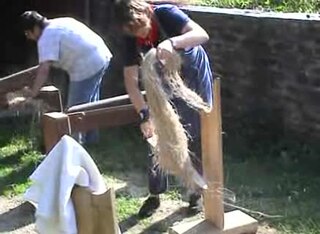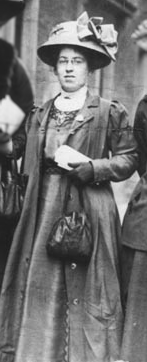Related Research Articles

Linen is a textile made from the fibers of the flax plant.

The Transport and General Workers' Union was one of the largest general trade unions in the United Kingdom and Ireland – where it was known as the Amalgamated Transport and General Workers' Union (ATGWU) to differentiate itself from the Irish Transport and General Workers' Union – with 900,000 members. It was founded in 1922 and Ernest Bevin served as its first general secretary.

Irish linen is the name given to linen produced in Ireland. Linen is cloth woven from, or yarn spun from, flax fibre, which was grown in Ireland for many years before advanced agricultural methods and more suitable climate led to the concentration of quality flax cultivation in northern Europe.

The textile industry is primarily concerned with the design, production and distribution of textiles: yarn, cloth and clothing. The raw material may be natural, or synthetic using products of the chemical industry.

The Irish Transport and General Workers Union (ITGWU) was a trade union representing workers, initially mainly labourers, in Ireland.
The Power Loom Tenters' Trade Union of Ireland was a trade union representing workers involved in stretching linen being manufactured in the Belfast area of Ireland.
John Doherty (1798–1854) was an Irish trade unionist, radical and factory reformer who devoted his life to political and social reform. He was born in Buncrana in Inishowen on the north coast of County Donegal in Ireland.

The Amalgamated Association of Operative Cotton Spinners and Twiners, also known as the Amalgamation, was a trade union in the United Kingdom which existed between 1870 and 1970. It represented male mule spinners in the cotton industry.

Heckling is the last of three steps in dressing flax, or preparing the fibers to be spun. It splits and straightens the flax fibers, as well as removes the fibrous core and impurities. Flax is pulled through heckling combs, which parts the locked fibers and makes them straight, clean, and ready to spin. After heckling and spinning, flax is ready to be woven into linen.

The Irish Trades Union Congress (ITUC) was a union federation covering the island of Ireland.

The Confederation of Shipbuilding and Engineering Unions (CSEU), often known as the Confed is a trade union confederation in the United Kingdom.

The Irish Congress of Trade Unions, formed in 1959 by the merger of the Irish Trades Union Congress and the Congress of Irish Unions, is a national trade union centre, the umbrella organisation to which trade unions in both the Republic of Ireland and Northern Ireland affiliate.
The Amalgamated Association of Beamers, Twisters and Drawers (AABTD) was a British trade union which existed between 1866 and 2002. It represented skilled workers in the cotton industry who were responsible for preparing warp yarns prior to weaving.
The Union of Jute, Flax and Kindred Textile Operatives was a trade union representing workers in the textile trades in and around Dundee in Scotland.
Belfast Trades Council, also known as Belfast & District Trades Union Council, brings together trade unionists in and around Belfast in Northern Ireland.

Rachel Devine (1875–1960) was a jute weaver and trade unionist. A founder member of the Dundee and District Union of Jute and Flax Workers who later became its president, she often went to the Scottish Trades Union Congress as her union's delegate.
Andrew Mulholland, was a northern Irish cotton and linen manufacturer.

The Game of Thrones Tapestry is a hand-crafted tapestry, woven by hand on a jacquard loom, with additional embroidery. The tapestry tells the entire story of the television show, Game of Thrones. It consists of seven 11-metre-long panels and one 10.5-metre panel. The eight panels depict scenes from each episode and include images of crew at work. The tapestry was commissioned by HBO and Tourism Ireland, the tourism bureau of Northern Ireland where HBO filmed much of the series.

Robert Gageby was an Irish trade union leader and politician.
The Flax Dressers' Trade Union was a trade union representing better paid linen workers in the north of Ireland.